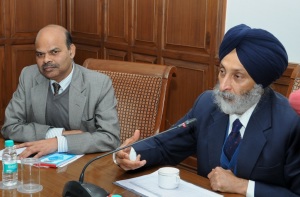
* District Grievance Redressal Officers and Nodal officers have been appointed
*17.9 lac families covered under the National Food Security Act, 2013
* Punjab first to issue UID compliant e-ration cards
Chandigarh, Food and Civil Supplies Minister Punjab said that Punjab was the first state to have implemented the National Food Security Act 2013.
Interacting with the media here today, Mr. Kairon said that earlier, only about 11% of the State’s population was eligible for receiving subsidized food grains, which was much lower than the neighboring states like Haryana with the same socio economic pattern. However, after the aggressive persuasion by Punjab, the coverage has increased manifold. Under the NFSA, 54.79% rural and 44.83% urban population in the state was to be covered under this Act. Out of the total population of 277.042 lac, 141.45 lac individuals were entitled for receiving subsidized food grains under TPDS/ NFSA, he said.
Giving details of the Act, Mr. Kairon said that as per the provisions of this Act, every person identified under the priority households would be distributed five kilograms of coarse food grains (Rs. 1/- per kg) or wheat (Rs. 2/- per kg) or rice (Rs. 3/- per kg) per month. Besides this District Grievance Redressal Officers and Nodal officers for all the districts have also been appointed as per the provisions of the Act.
To ensure regular supply of the food grains as per the demand of the beneficiary, the eldest woman (above 18 years) in a beneficiary family has been designated as “Head of Family” for the purpose of drawing ration. All the existing BPL and Blue ration card holders along with Antodaya families, total 17.9 lac families were covered first under the National Food Security Act, 2013 w.e.f. December 2013. The identification of new beneficiary families (having annual income less than Rs. 60,000/-) was done by the Deputy Commissioners according to the criteria decided for identification of beneficiaries.
He further said that the newly identified 13.0 lac beneficiary families were covered under Phase II and the distribution of wheat to the newly identified families had been started w.e.f. February, 2014. At present, about 31.0 lac identified beneficiary families are being covered under NFSA 2013 in the State. The state government was providing Door Step delivery of food grains as directed in the Act.
Referring to the State Government’s ATTA DAL SCHEME launched w.e.f. 15.08.2007 under which beneficiary families were being distributed subsidized wheat & pulses, he said that the government has now decided to cover all the identified NFSA beneficiaries under its own scheme, which was re-launched as NEW ATTA DAL SCHEME under the ambit of NFSA and all the beneficiaries were being distributed pulses @ Rs 30/- per kg along with their entitled quota of wheat.
Keeping in mind the empowerment of the consumers, the Minister said that it was decided to distribute 6 months quota in HDPE/ PP consumer bags weighing 30 kg. twice a year during the months of June & December. This decision was taken to ensure accurate quantity and good quality of wheat. Any kind of complaint in quantity or quality of the food grains would be addressed instantaneously. Leakage/Diversion free distribution of food grains, easy portability for consumers/ beneficiaries would be taken care of, added the Minister. This step of the government taken in the larger public interest would reduce the monthly visits of the consumers to the Fair Price Shops, said Mr. Kairon.
Making it safer, it was decided that the distribution of wheat would be in the presence of Government official and a member/s of Vigilance Committee. This would also ensure that the beneficiaries get their due wheat in standardized manner and any leakage/ diversion would also be checked. Earlier, the beneficiaries were distributed wheat out of old wheat stocks on FIFO principle. But now under NFSA, only fresh wheat stocks were being distributed to the beneficiaries.
Mr. Kairon also said that all the identified beneficiaries were being distributed UID compliant e-ration cards, and the Punjab government was the first state in the country to have initiated the e-ration cards to the beneficiaries, in order to ensure that only genuine/ deserving beneficiaries would get subsidized ration. The photographs of the beneficiaries were being taken from UID database. After the implementation of NFSA, the distribution was being done strictly on the basis of digitized database of the ration card holders.




 Driving Naari Programme launched in Chandigarh
Driving Naari Programme launched in Chandigarh






























